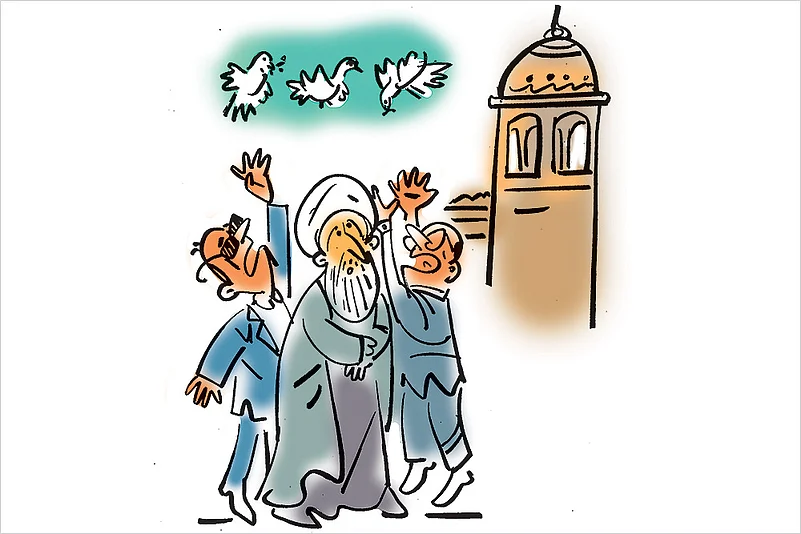Persianate Poo
Built under the auspices of the Qutb Shahi rulers of Golconda more than 300 years ago, Hyderabad’s historic Makkah Masjid is a symbol of Persianate architecture—and a thousand pigeons roost in its elegant minarets. There are, naturally, pigeonholes in the roof; this is perhaps the inevitable fate of such domed structures. The birds have been there for years, but it’s only now that their presence has caused alarm. When Iran’s President Hassan Rouhani visited the mosque to offer prayers and deliver a public address as part of his visit to India, his security staff was faced with a conundrum: there were twigs and droppings in the row where he was likely to sit while praying. The mosque authorities promised to address the issue ahead of the visit; in the absence of further reports, we can only pray that they succeeded.

Small Change In BEST Practice
All 40,500 employees of the Brihanmumbai Electric Supply & Transport Undertaking (BEST) went home with clinking pay packets as they were given Rs 500 of their January salaries in coins. This was the result of a little lateral thinking at BEST, when they were told by their bank, ICICI, that they lacked the space for all the small change deposited by the transport corporation. It isn’t the first time—most of the staff were paid like this back in March 2017, after a similar refusal by the bank. The employees, for their part, are just happy that they’re being paid at all, following the incident when a cash-strapped BEST threatened to withdraw their Deepavali bonuses after having given them out last year, (by deducting instalments from the monthly salaries that followed) before eventually agreeing to reverse the decision.

Slippery Hope
It might sound bizarre, but it is necessary”—the very apt words of Bihar School Examination Board president Anand Kishor, as quoted in the press, on the decision to ban pupils from wearing shoes and socks to the Class X board exams starting February 21. “The board has decided that only candidates wearing slippers will be allowed to enter the examination hall”, said Kishor. The move is similar to last year’s ban, which extended to full-sleeve shirts. Cheating is rampant in the state, with 985 students having been expelled during the recent intermediate exams for using “unfair means”, while another 25 were kicked out for impersonation. We hope probity doesn’t prove too slippery a concept.

Cut-Throats Of The Sky
They can cut you up quite badly, usually going for the nose, face, throat or hands. One man’s nose was slashed and another’s throat was cut as they rode their motorcycles in Bareilly, UP, recently. A student was killed last week. Such instances have prompted the Bareilly administration to take the drastic step of imposing Section 144 to stamp out the culprits: kites with sharp strings. These ‘Chinese’ manjha— plastic strings coated with powdered glass, are popular because they can easily cut the strings of opposing kites. There is now a ban on flying such kites in the city, although regular cotton strings are still allowed. However, the authorities are not targeting the suppliers, based in their own manjha market in the city—reportedly because the industry is worth Rs 50 crore annually and employs over 20,000 people.

Hammer, Sickle And Shoe
Our ragtag heroes escape the enemy on nimble feet with a flash of their trainers. “Goldstar shoes, the shoes of combatants. Always one step ahead.” But we’re talking about history, not a ’90s TV ad. Goldstar trainers were once the iconic footwear of Nepal’s Maoist guerrillas—just owning a pair could land you in prison. The quoted lines were sung by a punk band, the Kathmandu Killers, as a reference to this—and to how Goldstars are now a hipster accessory. Goldstar reportedy saw a 30 per cent rise in sales last year, as a generation which came of age after the conflict proudly wears its shoes—a domestic product in an economy flooded with Indian and Chinese imports.
More Than Red cloth
Be wary when driving down the Andaman Trunk Road—you may well be relieved of some of your possessions. There are increasing reports of Jarawa people coming to the road, forcing vehicles to halt and demanding food and water from travellers, with chains and purses being stolen in some cases. As many tourists use the road, which connects Port Blair and Middle Andaman—which includes the popular destination of Baratang island—to North Andaman, there are calls for more police to be stationed en route and more officials to travel in the vehicles.
When Hailstones Hurt Parrots
Pummelled by hailstones the size of lemons, hundreds of parrots took refuge in a peepal tree. Come morning, the locals found more than 460 dead birds at the foot of the tree. “It was a sad, heartrending sight,” said range forest officer Arvind Joshi. The hailstorm, which took place in Tumsar in Maharashtra’s Bhandara district, has animal rights activists worried. “Climate and, thus, weather change appear to be the primary reasons,” said Dr Manilal Valliyate, CEO, PETA India. He added that although the hailstones may have hurt the parrots, it would have been the climatic conditions that reduced their immunity or sent them into shock. Only six birds survived.

A Distance From Assets
Nations wait with bated breath for the tweets that announce momentous events in a world dominated by the button-happy Donald Trump. On February 21, Pakistan’s media reported on avoiding an embarrassment after foreign minister Khawaja Asif had tweeted that the US push to put Pakistan on the ‘grey’ list of the international Financial Action Task Force (FATF) had failed. This is a watchlist of countries deemed to be financially supporting terrorism. Asif wrote that there was “no consensus for nominating Pakistan” and that the body was “proposing 3 months pause & asking APG for another report to b[e] considered in June,” adding that he was “grateful to friends who helped.” ‘APG’ refers to FATF’s Asia/ Pacific Group.
The “friends who helped” may well have played a key role here. The PM’s advisor on finance, Miftah Ismail, had just returned from a week-long tour of Europe, where he had done his best to persuade FATF members that Pakistan had taken serious steps to comply with global standards aimed at combating terror financing and money laundering. He then returned with other senior officials to attend the FATF meeting in Paris. The recent ordinance that gave the government a free hand to proscribe terrorist outfits listed as such by the UN, resulting in the banning of Jamaat-ud-Dawa and other charities associated with Hafiz Saeed, would have helped the country in making its case. The Express Tribune reported that, according to sources, the resolution to put Pakistan on the list—jointly moved by the US and the UK—was opposed by Russia, China and Turkey.
However, Geo News quoted a US State Department official as stating that the claim that the FATF has deferred action for three months could not be confirmed, as the discussions are confidential until made public.
Pakistan was on the global terror financing watchlist from 2012 to 2015 before being delisted, with the FATF noting that its anti-terror-financing and anti-money-laundering measures had made significant progress and that it had put in place a satisfactory legal and regulatory framework to address previously identified strategic deficiencies. Being put back on the list would not come with sanctions, as FATF has no power to impose any, but it would still seriously hurt the country’s economy by subjecting international transactions to increased scrutiny, effectively increasing the cost of doing business and discouraging foreign investment.
Illustrations by Sajith Kumar






















